Anger Management Skills for Kids: 11+ Amazing Ways to Teach & Practice
This post may contain affiliate links. Please read my disclosure statement. Thanks for visiting!
Anger management skills for kids are super helpful ways to learn to manage emotions and more.
If you'd like to help your children learn and practice these essential life skills but not quite sure what to do or how, these 11+ tips and tricks are fantastic ways to get started.
Find out more about these important skills, including how to help your kids recognize angry feelings and deal with them in effective ways.
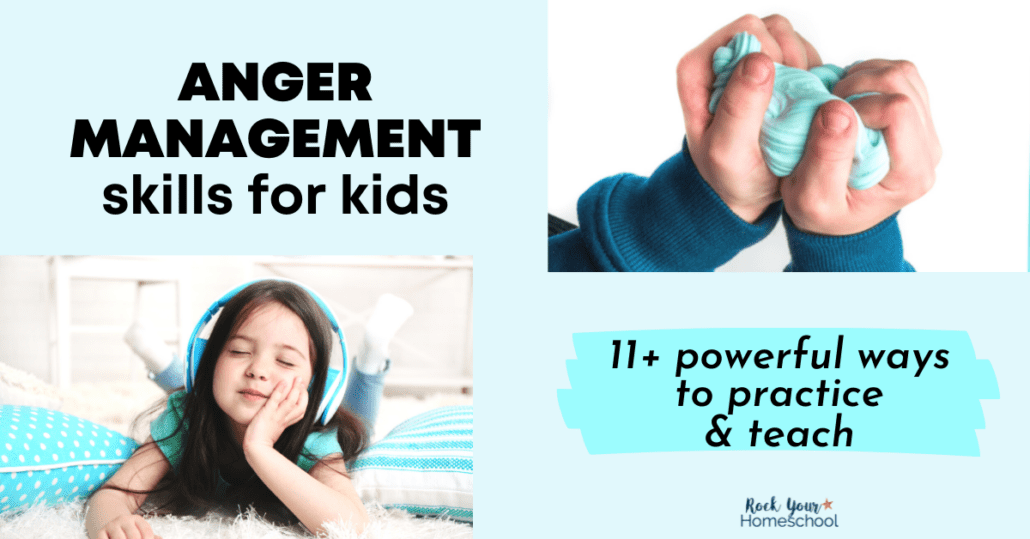
You CAN Help Your Kids Deal with Angry Outbursts & More!
Big emotions can feel scary, no matter what age you are.
And anger is definitely one of those intense emotions that can feel overwhelming.
The good news is that you can help kids of all ages (including adults) learn about angry outbursts, as well as better choices to handle anger issues (and all that comes with it) in a positive way.
When I worked as a mental health therapist with children and families, anger was a frequent underlying problem for a variety of issues. Anger can manifest itself in so many different ways! And have such an incredible impact on overall functioning.
But, anger can be sneaky. Plus, it can be frightening to address. You may worry that if you push too hard or make too big of a deal with it that the anger will just get worse.
The good news is that when you learn and practice anger management activities, you'll discover and enjoy better relationships with your kids (and loved ones).
If you're a parent, teacher, or someone who works with kids, then you know that feeling of powerless frustration when children throw temper tantrums or express angry reactions in negative ways.
It doesn't matter how well you've planned their day or how much they've had to eat, sometimes kids just get angry. It's normal for kids to get angry sometimes. But, if your child is having trouble managing their anger (and other big feelings), it can be tough on both of you.
Luckily, you can help your child develop healthy coping skills and anger management skills. Discover how you can use these anger management techniques, useful exercises, and different ways to help your kids learn the signs of anger and constructive ways to handle strong emotions.
Whether you're looking to tame a hot temper or help your child calm down once they're already angry, you'll find simple anger management skills to use and practice with your kids.
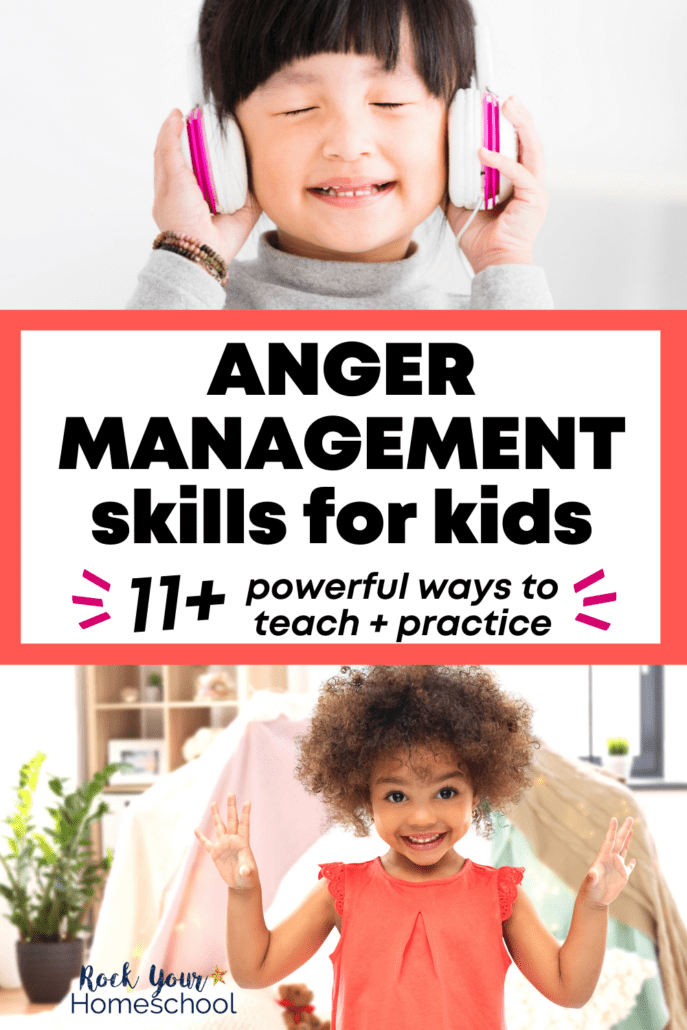
11+ Powerful Ways to Teach & Practice Anger Management Skills for Kids
Here are some anger management tips and tricks to teach and practice with your kids. These anger management strategies will help your children (and you) choose appropriate ways to deal with tough moments. With practice and time, you'll experience these essential skills working for you.
1. Be the change you wish to see
One of the best ways to help your child manage their anger is to set a good example yourself.
It's important for kids to see that adults get angry, too. It's okay to express anger in a healthy way. And it's powerful for your kids to see you choose a healthy anger management technique to deal with it!
When you're feeling angry, model the behavior that you want to see in your child. Explain to your child how you're feeling in a calm and constructive way. Help them understand that it's normal to feel angry sometimes, but it's important to find healthy ways to deal with that anger. These steps show your kids what they can choose to do the next time they are angry.
Take some deep breaths and count to 10. If necessary, take a break from the situation. And, most importantly, avoid saying or doing anything you might regret later.
2. Practice makes perfect
Another way to help your child is to provide opportunities to practice their anger management skills. You can do this by role-playing different scenarios with them. This type of activity is wonderful for problem-solving and figuring out coping strategies.
For example, pretend you're in the grocery store and someone cuts in front of you in line. What would you do?
With younger children (and older children can benefit from this idea as well), you can use puppets, toys, and stuffed animals as part of fun activities for role-playing.
Talk through different options with your child about self-control and see what they come up with. Be sure to discuss some inappropriate responses as well as the proper way to handle the situation.
2. Count to 10 for effective anger management skills for kids
This tip may sound cliche but it works. And is simple enough for your kids to understand and be able to do when in the heat of the moment.
I suggest coming up with a code word or signal to help your kids remember this strategy. Ideas include holding up and wiggling 10 fingers or simply saying "Ten".
When your child is in the middle of an anger outburst, sometimes all they need is a little time to calm down and stop seeing red.
If your child is old enough, encourage them to count to 10 (or 20, or 100!) before responding to the situation. If you are helping a small child, you can help by using your fingers to count with them.
This activity will give your children a chance to take some deep breaths and think about how they want to handle the situation in a positive way.
3. Think before you speak
One of the biggest causes of anger is word choice.
When we say something hurtful or inflammatory, it can often make the situation worse. Teach your child to think before they speak. Help them understand how their words might affect the other person and how they could respond in a more constructive way.
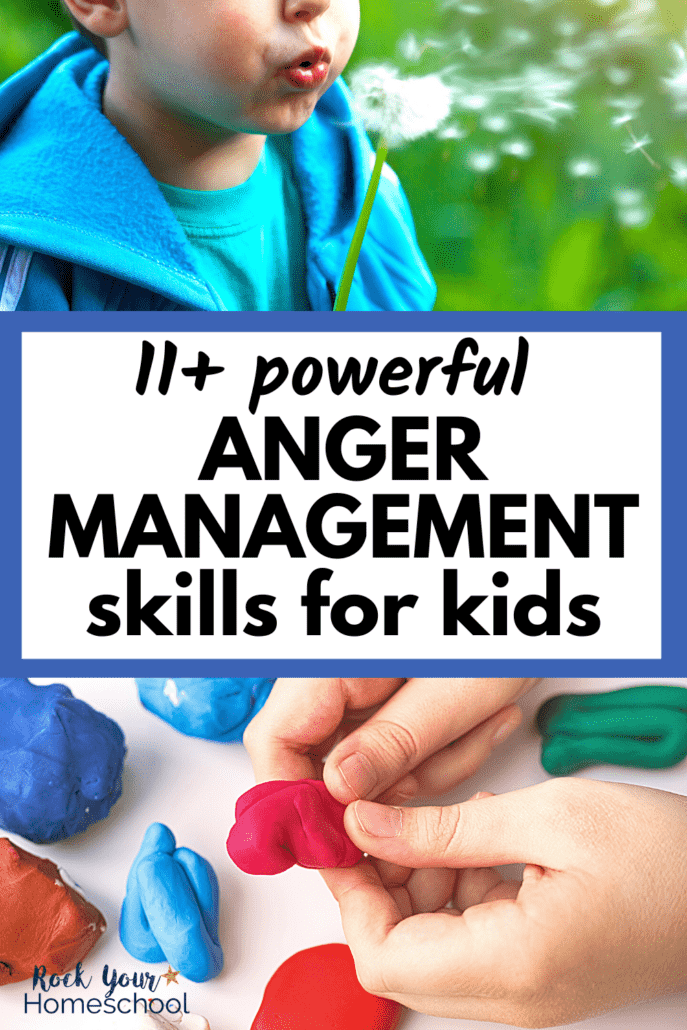
4. Take a timeout
If all else fails, sometimes a good thing to do is take a timeout.
If your child is experiencing anger triggers or feeling the warning signs of anger (or you're noticing them) and there's no immediate solution to the problem, suggest that they take a break.
This choice could mean going to their room for a few minutes or taking a walk outdoors. The important thing is that they remove themselves from the situation, prevented meltdowns, and allow themselves to calm down.
5. Talk it out for develop anger management skills for kids
It's a great idea to talk to your child about what might be causing their anger. Helping your kids learn how to express their feelings in a healthy way is an incredible gift that can help them throughout their lives.
The first step is to help your child identify their emotions. Kids who understand what they're feeling have an easier time managing their anger.
Sometimes, kids get angry because they're feeling frustrated or misunderstood. Anger can stem from so many things! Feeling tired, hungry, cold, or hot. Waking up on the wrong side of the bed. Someone looking at you the "wrong way".
Think about all the times that you get angry in a day, week, month - and then consider how someone who is younger and with less experience may feel!
Teach your child to label their emotions, both positive and negative. Helping them understand the root of their anger can go a long way in helping them manage it.
6. Get moving
An amazing way to diffuse anger is to get up and move around.
Encourage your child to do some jumping jacks, run in place, or dance around the room. If you can get outside, fresh air and movement can go a long way.
Physical activity can help release some of that built-up energy and allow your kids to better deal with the situation at hand.
This free fitness game with cootie catcher and prompts is such fun and can be a great distraction, too.
7. Help your child develop a positive self-image
A big part of anger management is having a positive self-image. Kids who feel good about themselves are less likely to get angry over small things. They're also more likely to be able to handle difficult situations in a constructive way. Growth mindset at it's best!
Teach your child to be kind to themselves and to give themselves compliments. Help your kids see the good in themselves, even on days when they're feeling down or less than.
You can also help your child develop a positive self-image by authentically complimenting their accomplishments, both big and small. Encourage them to spend time with friends and engage in activities they enjoy. The happier they are, the better they'll be able to handle anger.
8. Encourage a positive affirmation mindset
Another way to help your child develop a positive self-image is to encourage them to use affirmations. Affirmations are positive self-statements that can help change the way you think about yourself.
Teach your child some affirmations to use when they're feeling angry or frustrated. For example, "I am in control of my anger" or "I can handle this situation." Practice these statements with your kids. And open up discussion about these affirmations to talk about their thoughts and feelings.
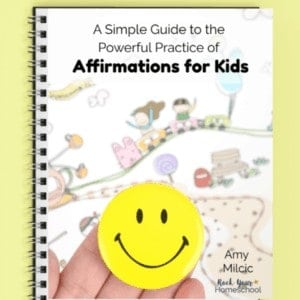
9. Provide support to encourage anger management skills for kids
It's important for kids to know that they have someone to talk to when they're feeling angry. Let your child know that you're there for them and it's a safe space to discuss what's going on.
Encourage your child to talk to you or another trusted adult about what's going on in their life. This type of talk could be with a teacher, coach, grandparent, or friend. Help them understand that it's okay to ask for help when they're struggling.
For example, my boys know that they can come to me whenever they need to "process" (that's our word for talking about big stuff and negative emotions). When my boys need to process, we do it one-on-one. I strive to provide a safe space, a place without judgment or criticism, for them to let loose and share what's going on inside of them. It's not always easy but it's been a tremendous way to build trust, support, and encouragement - especially for dealing with anger issues.
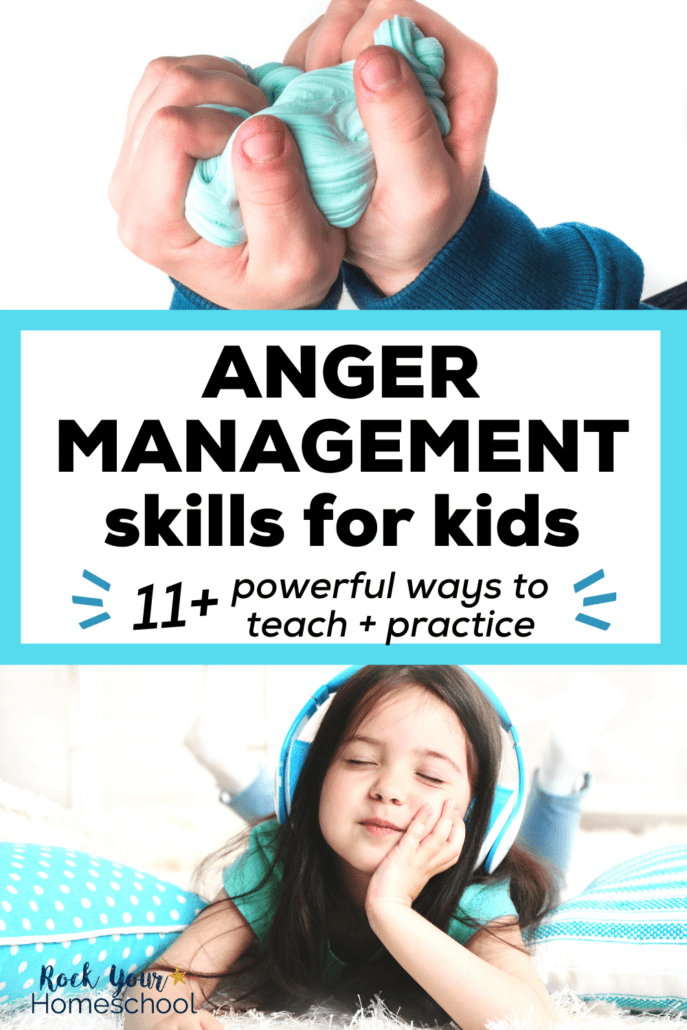
10. Healthy Coping Mechanisms for Anger Management Skills for Kids
When your child is feeling angry, it can be helpful to have a list of healthy coping mechanisms they can refer to. If your child knows what to do when they're feeling angry, it will be easier for them to manage their anger. A few things they could try are:
- Listening to calm music
- Drawing or painting or coloring
- Writing in a journal
- Deep breathing exercises
- Stretching or doing yoga
- Enjoying a hand-on activity
- Going outside for fresh air and exercise
- Reading a book (especially an old favorite!)
- Looking out the window and just observing
- Playing with a pet
Encourage your child to try different coping mechanisms and find the ones that work best for them.
Finally, be patient! It takes time and practice for kids (and adults) to learn how to manage their anger effectively. With patience and encouragement from you, your children will be able to get their anger under control in no time.
I sincerely hope these tips and ideas will help you and your children manage anger in a healthy way. If you have any other suggestions, please share them in the comments below!

Thank you for all these excellent tips and activities. I liked the one where kids needed to express their emotions with drawings. I am sure it would be really great to watch how your kids imagine different situations; from bad to good and this way, kids can process their emotions better and learn to regulate their emotions.
Thank you for this extensive article on anger and handling it. I have a little guy we adopted 3 years ago, and recently he has been really dealing with a lot of anger. This has caused our environment in our house to be less than pleasant to be around and as homeschoolers, there is not a lot of opportunity to get away from each other. I have felt a lot of stress over this, and summertime has made things more difficult with lack of structure and schedule. That is the first thing I am tackling. I greatly appreciate all the advice, suggestions, explanations, and encouragement you have offered through this post. Thank you so much. We are going to work on these things all together as a family, because we all deal with it in different ways, and several of us in not healthy ways. Thank you!